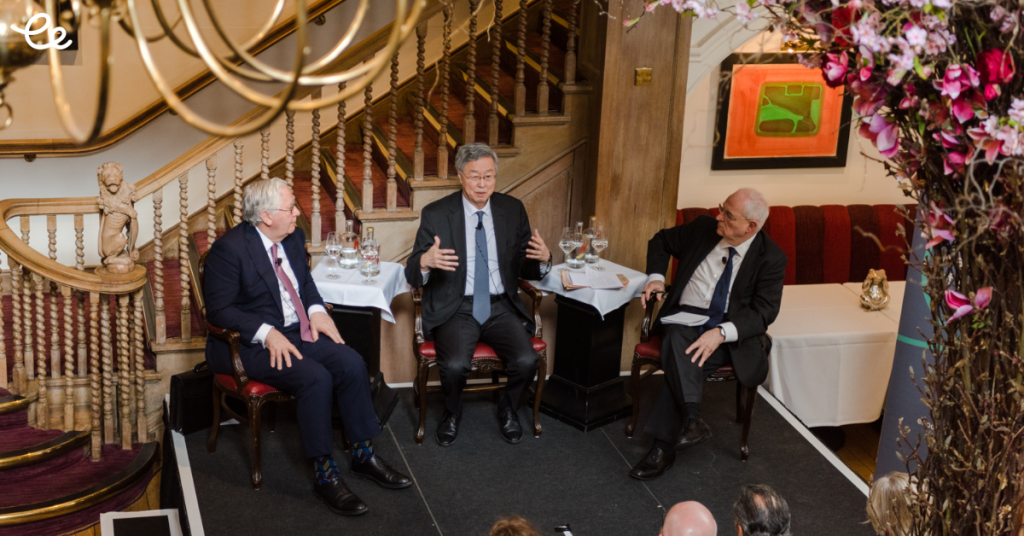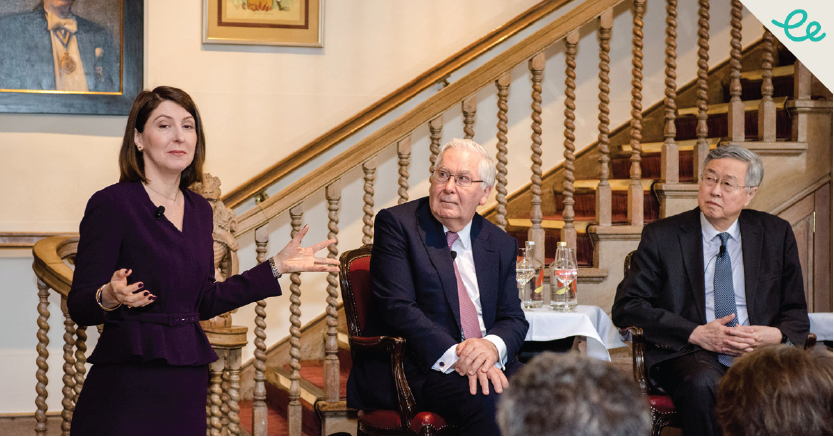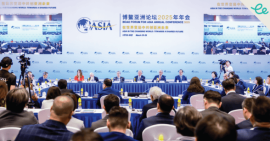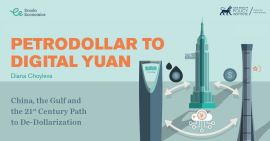China Will Keep Opening Up, Promises Mr Renminbi
Enodo Special Event
Here is a sneak peak of the event.
Zhou Xiaochuan, former Governor of the People’s Bank of China, and Mervyn King, former head of the Bank of England, discuss financial liberalisation in China, what’s wrong with the global financial system and the need for global rebalancing.
Introduced by Enodo’s Diana Choyleva and moderated by the FT’s Martin Wolf.
Crises that shook the world have held back China’s financial liberalisation and exchange-rate reform, but Beijing remains committed to further reform and opening up, says Zhou Xiaochuan, the former governor of the People’s Bank of China.
The US-China trade war may hamper progress, since market access to China’s financial sector is a bargaining chip in talks to resolve the dispute, according to Zhou. Yet despite these “negotiation games… I think we have quite good determination to have much braver financial sector liberalisation and open-door policy,” China’s “Mr Renminbi” told an event hosted by Enodo Economics in London on 14 March.

The long-time central banker was joined by his counterpart Lord Mervyn King, former governor of the Bank of England, for a discussion that ranged widely from savings, banks and debt to China’s future role in the global financial system. Zhou and King, who agreed the West’s first central-bank yuan swap deal in 2013, spoke in conversation with Martin Wolf, chief economics commentator at the Financial Times.
Setting the scene, Enodo’s chief economist, Diana Choyleva, argued that China now faces the most difficult external environment in 40 years, after “a sweeping bipartisan change in US attitudes towards China”. Globalisation “as we have had it in the past 20 years has begun to unravel”, she said. “It’s difficult to argue that the rules of engagement should stay the same.” The scale of today’s macroeconomic and financial challenges “is yet again frightening”, she warned.
King echoed those concerns, starting with monetary reform: “We should be worried, in my view, because by accident we’ve moved into a system in which we have a lot of savings from China integrating into the world financial system.” It is a system that has “blundered” to a point where the euro area, the world’s biggest currency bloc, exports deflation and has now a bigger current account surplus than China, King argued.
In 2008, the G7 “handed onto the G20 the role of being the group that discussed and ‘managed’ the world economy, and actually the G20 didn’t grab that and run with it,” said King, who led the BoE during the Global Financial Crisis (GFC).
The challenge was to create new institutions. “The Americans have basically given up. They have no interest in changing anything,” King said. “One of the great damaging impacts of the way in which America has come to dominate the debate in this area is that they only think in terms of firefighting, not in terms of reforming the system which will make fires less likely to break out.”
Just as New York displaced London as the global financial capital, China could “naturally” become the centre of the world’s financial system, given that it is now home to the bulk of the world’s savings, commented Martin Wolf. Why hasn’t that happened yet? China’s financial system and flows remain largely locked in by domestic controls.
The Asian Financial Crisis (AFC) partly explains China’s high savings rate of 45%, said Zhou, who forecast a fall to around 40% in the next five years.
The renminbi and Chinese savings should have some role to play in the international monetary and financial system, he said. China’s per capita GDP remains below that of advanced economies, “but you have a high savings rate, you have to use that”.

China hopes to see gradual change in the global monetary system, for instance with “a kind of basket” serving as the international reserve currency, Zhou said, reprising a forceful argument he made in 2009 for the creation of a super-sovereign currency. But he recognised that the prospect remains remote unless the US shifts its stance, and he downplayed talk of Chinese ambition to carve out a higher profile for the renminbi.
China’s transition to a market economy remains “a learning process”, he went on. “Serious preparation” for current account convertibility in 1996 was disrupted by the AFC. By 2003, the government’s reform blueprint once more emphasised financial liberalisation amid domestic debate on the need to protect a financial sector that at the time was an infant industry, said Zhou. The GFC prompted further delay.
“Finally, I think now we come into a new stage that surely we’re going to have much higher financial liberalisation,” Zhou said. “In terms of exchange rate mechanism and because IMF already put RMB into SDR basket, we need to let the RMB be a freely usable currency and market access.” As Chinese banks now rank among the world’s largest, the argument that an infant industry needs protection no longer holds water, he added.
Whenever Beijing was “tempted to put a toe in the water in a big way”, Wolf replied, they realised “the water is very, very, very stormy”. Unsealing China’s financial system “is very much on the table”, he said, but neither China nor the West “have the faintest idea how to manage the absorption of this stupendous financial savings potential in our system. The last time we tried to absorb a new great financial power we got the ‘20s and ‘30s.”
To avoid such crises, King endorsed China’s caution, especially given global imbalances and the lack of international cooperation to resolve them. “To look for a lesson from market economies, you would draw the lesson surely that liberalisation is not something to rush,” he said. “We haven’t really had any recognition that in some sense we’re all in it together, and to focus on trade as President Trump has done is to focus on a symptom not an underlying cause.”
The low savings ratio of the US and the UK is just as important as China’s high savings ratio, for “these policies have international consequences and we don’t actually have a system or a framework for being able to discuss, debate and handle what these consequences are”, King added. He predicted the pace of official change in the international financial system would remain “very slow”.
Liberalisation can’t work, he warned, “if you’ve got a macro-economic framework behind it that is prone to frequent periods of instability and a sheer inability to create bodies like the G7 or the G20 which can discuss openly and honestly the need for everyone to rebalance their economies rather than engage in a blame game of saying ‘it’s this country or that country’”.
Don’t expect China to establish a new IMF anytime soon, said Zhou. The AFC sparked calls for an Asian IMF as many countries were angry with the Washington-based lender. But Zhou said the region is so “complicated” that it’s “difficult to reach meaningful consensus”.
Inadequate progress on IMF quota reform, to better “represent the changing globe”, has prompted the search for new mechanisms, said Zhou. The Asian Infrastructure Investment Bank and New Development Bank act as “a good complement to the existing multilateral banking system, but it’s relatively gradual”. If that system does a poor job, it will encourage the AIIB and NDB “to grow a little bit faster”.
As for China’s high debt-to-GDP ratio, Zhou said deleveraging is “a very difficult process” and the priority is to stabilise the ratio at around 250%. An analysis of the structure of Chinese debt shows that a significant amount of corporate debt is in fact hidden local government debt, he said.

Fiscal reform is required to establish better relationships between central and local governments that shoulder huge responsibilities, such as building public infrastructure and absorbing migrant flows, without sufficient authority to raise local income.
Beijing must also overhaul the state-owned enterprise sector to reduce the “crowding out” effect of inefficient borrowing on the private sector, said Zhou. He expressed optimism that China can manage economic growth of around 6% while stabilising debt at the current level.
We are “on track to develop better capital markets”, as China has learned many tough lessons and will remain a relatively high savings country, Zhou said. If 10% or 20% of savings were to go into equity financing, the debt percentage can be significantly reduced. “Gradually, we come into a new stage that equity financing can go much faster and then the debt level can be stabilised or may be lowered down,” he said.
If you would like to get access to the recording of the whole event, please email your request at press@enodoeconomics.com










Comments are closed.